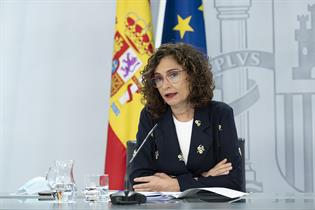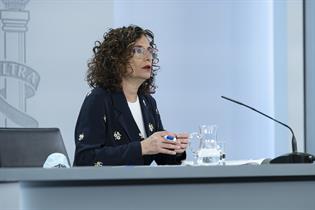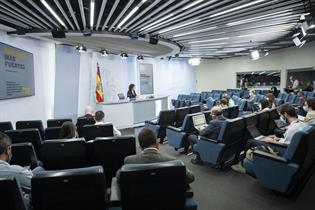Extraordinary Council of Ministers
Government extends benefits under ERTEs and support for independent contractors until 30 September
Council of Ministers - 2020.6.26
Moncloa Palace, Madrid
The Council of Ministers approved the Royal Decree-Law of social measures to reactivate employment and to protect independent contractors, which will extend benefits and exemptions under Temporary Lay-off Plans (Spanish acronym: ERTEs) and support for independent contractors established as a result of the health and economic crisis caused by COVID-19 until 30 September.
This law established, on the one hand, the 2nd Social Agreement to Defend Jobs signed on Thursday by the government and business organisations and trade unions, and, on the other hand, the agreement reached with the main associations of independent contractors. The Minister for the Treasury and Government Spokesperson, María Jesús Montero, thanked the social stakeholders for their will shown in combining interests and obtaining beneficial results in the general interest and to the benefit of the whole of society. "The path of unity, dialogue and consensus is what people are calling for", she said.
María Jesús Montero stated that social dialogue should also be the basis for achieving "a great employment pact that lays the foundations for a dynamic, modern and stable job market".
Effective ERTEs
The Government Spokesperson defined the ERTEs as an "effective" mechanism to avoid the shedding of jobs, particularly for young people and those on temporary or insecure employment contracts, and to incentivise the recovery of corporate activity, and hence, of jobs. Accordingly, she highlighted that the benefits of the exemptions will be even greater if companies reincorporate their workers rather than maintain their jobs in suspension.
Those companies that have invoked an ERTE on grounds of partial force majeure can benefit from the exemptions in force until 30 September. Those that have fewer than 50 employee will enjoy a 60% exemption from making social contributions of those workers that re-join the workforce in the months of July, August and September, and of 35% for those workers that remain on suspension. In the case of companies with more than 50 workers, these exemptions will be 40% for those that re-join the workforce and 25% for those that remain on suspension.
For those companies under a total ERTE, a transitional period is established during which they benefit from decreasing exemptions. Those companies with less than 50 workers will obtain a discount in social contributions of 70% in July, 60% in August and 35% in September. For those companies with more than 50 workers, this percentage will be 50%, 40% and 25% respectively.
 Pool Moncloa/Borja Puig de la BellacasaThe minister highlighted a new feature whereby, in the event of new outbreaks of COVID-19, companies can resort to a new ERTE on grounds of force majeure, with discounts of around 80% for companies with fewer than 50 workers and of around 60% for those with a larger workforce.
Pool Moncloa/Borja Puig de la BellacasaThe minister highlighted a new feature whereby, in the event of new outbreaks of COVID-19, companies can resort to a new ERTE on grounds of force majeure, with discounts of around 80% for companies with fewer than 50 workers and of around 60% for those with a larger workforce.
On a general basis, companies that sign up for any of these exemptions must maintain jobs for a period of six months, and hence cannot impose dismissals. Companies based in tax havens are still unable to benefit from this type of plan.
For their part, those workers affected by an ERTE on grounds of COVID-19 do not have to accredit a minimum period of social contributions to benefit from this provision, nor will the time in which they remain in this situation be calculated for the purposes of unemployment contributions.
Extension and increase in support for independent contractors
The Government Spokesperson stated that it is a "priority" to protect independent contractors, and hence the measures established in March for those affected by the cessation of activity or a drop in turnover will be extended until 30 September.
The agreement reached with the associations ATA, UPTA and UATAE provides that independent contractors that were receiving an extraordinary benefit, which included economic support equivalent to 70% of the regulatory base and an exemption in social contributions, will not need to pay their July contribution and will receive a 50% exemption in August and a 25% exemption in September.
Furthermore, those that can accredit a drop in turnover of 75% in this third quarter on the same period last year may apply for the ordinary benefit for the cessation of activity.
María Jesús Montero underlined the approval of an extraordinary benefit for seasonal independent contractors - "traditionally forgotten" - of up to 70% of the minimum regulatory base. This support will begin to accrue in June and will have a maximum duration of four months.
Electro-intensive entities
 Pool Moncloa/Borja Puig de la BellacasaThe Council of Ministers approved the Spanish Reserve Fund of Guarantees for Electro-intensive entities (Spanish acronym: FERGEI), which are those industries for which electricity is a primordial factor in their productive process. The fund has a provision of 200 million euros per annum to cover a maximum of 600 million euros of investment over three years.
Pool Moncloa/Borja Puig de la BellacasaThe Council of Ministers approved the Spanish Reserve Fund of Guarantees for Electro-intensive entities (Spanish acronym: FERGEI), which are those industries for which electricity is a primordial factor in their productive process. The fund has a provision of 200 million euros per annum to cover a maximum of 600 million euros of investment over three years.
The Government Spokesperson reported that this has been a much clamoured for fund by the sector, because it guarantees State cover for purchase and sale operations of electricity in the medium and long term by electro-intensive consumers.
María Jesús Montero considers it fundamental for relations between electro-intensive consumers and electricity companies to have a framework that is tied into renewable energy plants that promote the development of sustainable energy. Through this fund, she specified, the government wishes to generate security for electro-intensive companies, guaranteeing profitable contracts for them while promoting access to clean energy that is respectful of the environment at a competitive price.
The minister stated that this instrument is integrated in the Electro-intensive Consumer Statute, which is in the final phase of its passage towards enactment and will be approved in the coming weeks.
Current affairs
María Jesús Montero welcomed the fact that the Lower House of Parliament approved, by a majority, the Royal Decree-Law on Thursday regulating the legislation that will prevail throughout the country following the end of the state of emergency. In her opinion, the Spanish people need a broad consensus and backing to push through useful measures that drive the economy.
The Government Spokesperson reiterated that the virus has not gone away, the pandemic remains a drama for the planet and we cannot let our guard down because this would be a step backwards. The health figures, she added, show that the virus "is controlled under criteria of alert and special caution", and it is fundamental that any outbreaks that may take place are cut off prematurely by the regional authorities, and that citizens heed expert recommendations.
For her part, the minister congratulated all those people and entities that have made contributions to the Committee for the Social and Economic Reconstruction set up in the Lower House of Parliament. In her opinion, this committee is a good starting point for political groups to work on in order to offer a "speedy, flexible and effective" response to the public.
Minimum Living Income
The Government Spokesperson underlined that the social security system will make the first payment on Friday of the Minimum Living Income to more than 74,000 households around Spain - some 250,000 people who had been receiving a benefit for children in their care without a disability or with a minor disability of less than 33% and that meet the requirements established in the law to receive this new benefit.
María Jesús Montero stressed that the Minimum Living Income will contribute to making social policies fairer to ensure a cohesive and prosperous Spain.
European Union Reconstruction Fund
 Pool Moncloa/Borja Puig de la BellacasaMaría Jesús Montero remarked that cohesion, social justice and the economic recovery are precisely the cornerstones to guide the implementation of the European Union Reconstruction Fund.
Pool Moncloa/Borja Puig de la BellacasaMaría Jesús Montero remarked that cohesion, social justice and the economic recovery are precisely the cornerstones to guide the implementation of the European Union Reconstruction Fund.
Spain, she argued, is a fundamental piece in the European machinery, where active policies are being pushed through so that the countries that have suffered the most in the pandemic can exit the economic depression as soon as possible.
The government, she highlighted, is firmly convinced that the Third Vice-President of the Government and Minister for Economic Affairs and Digital Transformation, Nadia Calviño, can play a key role in the Presidency of the Eurogroup. "We believe that she is the best candidate to hold this post and trust that her candidature will obtain the backing it deserves due to her soundness, rigour, commitment and values".
In this context, María Jesús Montero called for none of the political forces to place their party interests ahead of the general interest because reaching an agreement and boosting a robust Reconstruction Fund for the whole European Union "is not simply a victory for the Government of Spain, but for all our companies and citizens".
Non official translation





